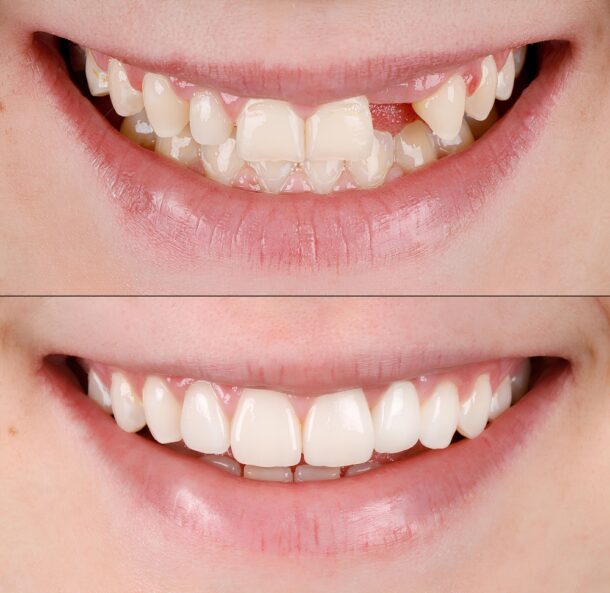What are Dental Bridges?
Dental bridges are an excellent solution for tooth loss, as they offer many advantages, such as improving speech, restoring the appearance of your smile, and maintaining the shape of your face. A dental bridge can replace one or more missing teeth by affixing false teeth to natural teeth or dental implants.
However, it is important to note that dental bridges require proper care and maintenance, including regular dental cleanings and good oral hygiene practices. Failure to maintain good oral hygiene can lead to plaque formation and plaque retentive areas, which can result in periodontal disease and compromised teeth.
The longevity of a dental bridge also depends on various factors, including the type of bridge used, the crown-to-root ratio, and the mechanical strength of the dental materials used. For example, ceramic restorations and veneering materials can offer excellent aesthetics, but may not be as durable as metal frameworks.
Additionally, transitional or provisional restorations may be necessary during the treatment period, including the time of cementation and the first month post-insertion. Patients with compromised bone may require a bone graft before the placement of the bridge.
Prosthodontic treatment, such as dental bridges and single crowns, can also be part of a larger treatment plan, including orthodontic treatment or partial denture placement. It is important to work with a dental professional to create a customized treatment plan that addresses your individual needs and concerns.
In summary, dental bridges are an effective solution for tooth loss, but proper maintenance and care are crucial for the success of the treatment. Patients should follow the Guidelines for Crowns, including plaque control and regular professional cleanings, to ensure the longevity of their restorations and maintain their oral health.
Types of Dental Bridges
There are several types of dental bridges available, depending on the specific needs of each patient. Some of the most common types include:
Traditional Bridges
This is the most common type of dental bridge, consisting of one or more artificial teeth (pontics) held in place by dental crowns cemented onto the adjacent natural teeth.
Cantilever Bridges
This type of dental bridge is similar to a traditional bridge but is supported by a dental crown cemented to only one adjacent tooth. Cantilever bridges are less common and typically used when there is only one suitable abutment tooth.
Maryland Bridges
This type of dental bridge uses a metal or porcelain framework to attach the pontic to the adjacent teeth. Maryland bridges are more conservative, as they do not require the abutment teeth to be reduced for crowns.
Implant-Supported Bridges
These bridges are supported by dental implants instead of natural teeth. This is a more stable and long-lasting solution for replacing multiple missing teeth.

Benefits of Dental Bridges Near Surrey
The gaps between your teeth can affect your self-esteem. They can also cause speaking and eating difficulties. Our dental clinic in Delta, BC, may recommend dental bridge treatment near you due to the different benefits they can offer you.
More Benefits of Dental Bridges in Surrey, BC
Dental bridges offer numerous benefits for patients with missing teeth
1. Restoring Your Beautiful Smile:
Dental bridges fill the gaps in your smile, boosting your self-confidence and enhancing your appearance.
2. Improving Chewing Function
Missing teeth can cause discomfort and difficulty in chewing. Dental bridges help restore your ability to eat comfortably and efficiently.
3. Enhancing Speech:
Dental bridges can improve your speech by replacing missing teeth that may have caused issues in pronouncing certain words.
4. Maintaining Facial Shape:
Dental bridges prevent jawbone deterioration, which can lead to facial collapse and a change in the overall shape of your face.
The Dental Bridge Procedure
Consultation and Planning
The dental bridge procedure starts with a comprehensive consultation at our dental clinic in Delta, BC. Our experienced dentist will evaluate your dental health, discuss your treatment options, and determine if a dental bridge is the most suitable solution for your needs.
1. Tooth Preparation
If you opt for a traditional, cantilever, or Maryland bridge, our dentist will prepare the adjacent teeth by removing a small amount of enamel to accommodate the dental crowns or framework. In the case of implant-supported bridges, dental implants will be surgically placed in your jawbone.
2. Bridge Fabrication
Impressions of your teeth will be taken and sent to a dental laboratory, where your custom dental bridge will be fabricated. This process typically takes a few weeks.
3. Bridge Placement
After your dental bridge has been custom-made, our dentist will place a temporary bridge to protect your prepared teeth while you wait for the permanent bridge. During this time, it is essential to maintain good oral hygiene and prevent gum disease, as it can affect the success of your dental treatment.
If you have dental insurance, check with your provider to see if they cover the cost of dental prostheses like bridges. Once your permanent bridge is ready, our dentist will remove the temporary bridge, and the custom-made bridge will be put in place. The dental bridge will act as a replacement for your missing teeth and restore the function of your tooth structure.
Additional treatments may be necessary for the success of your dental restoration, such as using ceramic materials to enhance the aesthetics of the crown or artificial root to provide support for the bridge abutments. Conventional bridges or a custom-made bridge may be used, depending on your needs.
It is essential to prevent drifting of teeth or improper tooth contour, which can lead to tooth fracture, wear of teeth, and failures of restorations. Regular removal for cleaning is necessary to prevent plaque formation, plaque retentive surfaces, and gum disease.
Maintaining good dental hygiene through brushing, flossing, and visiting a dental hygienist for professional cleanings is crucial for the health of your teeth and gums. A balanced diet and a dental plan can also help prevent dental disease and maintain oral health in patients.

Advantages of Dental Bridges in Surrey
Dental bridges offer numerous benefits for patients with missing teeth:
- Prevents teeth from shifting and misalignment.
- Distributes bite forces evenly, reducing stress on individual teeth.
- Helps preserve facial structure by preventing bone loss in the jaw.
- Restores functionality for improved eating and speaking abilities.
- Provides a natural-looking replacement tooth or teeth.
- Helps maintain healthy teeth and prevent tooth decay.
- Can be customized to match the color, shape, and size of your natural teeth.
- Resin-bonded bridges offer a less invasive option for some patients.
- Temporary restorations can be used during the treatment period, allowing for a faster and more comfortable process.


